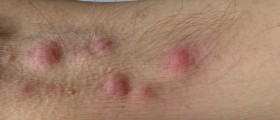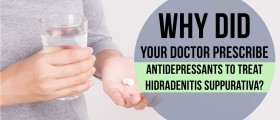Loading...
Loading...
Loading...
Loading...
Loading...
Loading...
Loading...
Loading...
Loading...
Loading...
Loading...
Since I started menstruation at 9 years old, I’ve had a problem that I never even told my mum about. About a week before my period I get a boil on my vagina area that is very painful and gets bigger and bigger as the days pass.
Eventually it either bursts and releases pus and blood, or it just goes down. This will always happen by the time my period is over. Over the years it has come and gone, sometime being as big as an egg. I used to use a sterilised needle and prick it to get relief from it.
The skin around the area is awful, there is a lot of scarring
I’ve seen many doctors, they usually give me antibiotics, and tell me it’s an inflamed hair follicle, but this never made any sense to me because it was always around my period, which makes me believe it’s hormonal. No-one has ever really questioned it further and folliculitis has been the reason written in my medical notes. A few years back a doctor told me to stop shaving as it was probably the problem.
I used hair removing cream and the problem still existed. The doctor then told me to stop removing hair full stop which I did and the problem was still there.
Over the past few months, there has been a big change.
3 months ago, the boil did not go down by the end of my period. 2 months ago another boil came up right next to the other one, and didn’t go down either.
I started searching online for ideas of what it could be and a discussion on a women’s health site made me look into hidradenitis suppurativa. As I was reading the experiences from other women, I felt like someone had written my story down. I went to my doctor, and said I suspected this condition and that these 2 boils are very painful.
He said that HS usually appears in the armpits and he hasn’t heard of it being in the vagina area before. He gave me some antibiotics and sent me on my way. I didn’t ask him to have a look, as I still don’t like being examined by a male doctor.
Well I finished the course last week and not only were they still there, but they were now open wounds. It hurt to wear underwear, and was really really itchy. To top it off another one has started forming as I’m due on my period soon.
I managed to get an appointment yesterday with a female doctor and walked in with no underwear on, lifted up my skirt and asked her what the hell was going on! She had a look, and then said I have HS.
I nearly cried with relief, finally someone has given me a name. She gave me some strong antibiotics that will help the ones I have, some magnese sulphate paste to dress the area, and then I have to take a long term course of antibiotics to see if it will kill the bacteria that causes HS to form. I’ve been given 2 months to start, and if it works then I will have another 4 months of the to take. She was glad to hear that I wash and dry the area with a different flannel/towel as she said while the condition is not catching, the pus can cause boils in other areas too.
When I asked her what would happen if the antibiotics doesn’t work, she said surgery. That shocked me so I came home last night and started to research this condition.
There is no cure.
Apparently it is always mis-diagnosed (as I know) and people feel too embarassed to speak about it, so there has not been any real research done into why people get it.
I’m really upset that there isn’t a cure, but I have found some treatment ideas on some of the support sites I have found. I will work my way through them to see if they will make a difference.
This has got me thinking about the potential results of my back and neck pain. It feels good to have a name, but what if there is no cure? I still think knowing what you have is better because you can try treatments that are supposed to work for your condition and can have a support network.
Here is the information from the British Skin Foundation
What is hidradenitis suppurativa?Hidradenitis suppurativa is a chronic and stubborn disease centred on inflammation of the large specialised sweat glands (apocrine glands) that are found mainly in the armpits and groins. These areas show a distinctive mixture of boil-like lumps, areas leaking pus, and scarring.What causes hidradenitis suppurativa?It is still not clear why the apocrine sweat glands are affected like this in some people, but mechanical blockage plays a part. As the secretions cannot escape, the tubes containing them may swell up and burst, or become infected.Contributory factors include the following:Hormones are involved in the control of apocrine sweat glands and certainly play a part in the disease. Hidradenitis suppurativa affects women more often than men. It does not start before puberty or after the menopause. It may get better during pregnancy, but is often worse before menstrual periods. Some patients do well with hormone treatments (see below).Bacteria play a part too, but a variety of germs, and not just one special type, is found in the spots. It is not clear whether they cause the disease, or just flourish within it.There may be a link with acne.
Is hidradenitis suppurativa hereditary?Hidradenitis suppurativa sometimes runs in families, and some patients or family members may also have had bad acne, or a chronic abscess at the base of the spine (a pilonidal sinus).What are the symptoms of hidradenitis suppurativa?Hidradenitis suppurativa can be itchy, but is usually painful, and the lumps hurt if they are pressed.What does hidradenitis suppurativa look like?The severity of hidradenitis suppurativa varies from person to person. The main areas to be affected are the armpits, and the skin around the genitals – in the pubic area and in the groins. The skin around the back passage, on the upper buttocks and thighs, and below the breasts, can give trouble too.In these areas, the skin shows a variable mixture of blackheads, red lumps looking like boils, pus spots, cysts, and areas that constantly leak pus (sinuses). The abscesses can even burrow into nearby structures. As time goes by, more and more scarring appears.How will hidradenitis suppurativa be diagnosed?The diagnosis is made clinically, taking into account the areas that are affected, and the look of the spots. Your doctor may take swabs from the area to see which type of germ is present.Can hidradenitis suppurativa be cured?No, it usually persists for many years, but may disappear eventually. Treatment usually helps even though it cannot switch the hidradenitis off once and for all.How can hidradenitis suppurativa be treated?There are many ways in which your doctor can help you with your hidradenitis suppurativa. In general terms, early hidradenitis suppurativa is usually treated medically, whereas hidradenitis suppurativa that has been going for a long time may need surgery:If hidradenitis suppurativa suddenly becomes worse: This may be due to an infection with ordinary germs of the types that infect cuts and grazes; so antibiotics such as flucloxacillin may be used as a short course.Frequent episodes of this type, with proven bacterial infection, usually mean that you have a sinus or abscess (see treatments below).Suppressive therapy:
Antibiotics by mouth, taken are long-term, help to suppress attacks. The ones that are used are the same ones used for acne – such as oxytetracycline. They are sometimes put on as topical applications.Other anti-acne drugs such as isotretinoin (vitamin A derived tablets) may help too, but have important side effects and are available only from dermatology departments.For women whose hidradenitis suppurativa flares before each period, tablets known as antiandrogens can be useful. The usual one is cyproterone acetate, 50 mg taken on days 5-15 of the menstrual cycle in conjunction with an oral contraceptive called Dianette. It cannot be used for anyone with a tendency to have high blood pressure or to form blood clots.If the disease is severe, stronger drugs including oral corticosteroids may be used but all carry the risk causing of side effects.
Treatment of scarred sinuses and abscesses:
Persistent discharge or infection in the same site usually means that the medical treatments listed above will not work, and surgical operations – either to remove small areas of repeated inflammation, or wider procedures to take away all the diseased glands – are needed in some cases. In general, hidradenitis of the armpits does better with surgery than hidradenitis in other sites.
What can I do? If you are too heavy, you will need to lose weight.As with many other diseases in skin folds, friction makes hidradenitis suppurativa worse, and should be avoided.You should wash with antiseptic soaps or bath additives.
